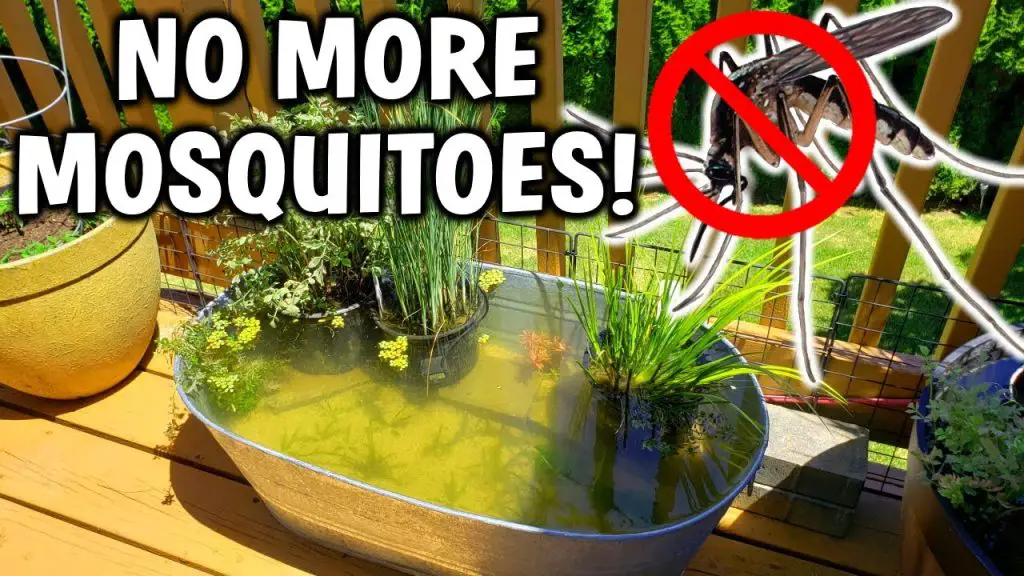Mosquito larvae can quickly become a nuisance in ponds, leading to an increase in adult mosquito populations. Not only are mosquitoes annoying, but they also pose health risks due to the diseases they can carry. Fortunately, there are several effective methods to keep mosquito larvae out of your pond. Let’s explore some practical strategies to help you maintain a mosquito-free environment.
1. Use Mosquito Dunks or Bits
Mosquito dunks or bits are environmentally friendly and effective in controlling mosquito larvae in ponds. These products contain a bacterium called Bacillus thuringiensis israelensis (BTI), which targets mosquito larvae specifically. Simply place the dunks or bits in the water, and they will release the BTI, killing the larvae without harming other aquatic life.

Credit: ucanr.edu
2. Introduce Mosquito-Eating Fish
Another natural way to control mosquito larvae in your pond is by introducing mosquito-eating fish such as guppies, goldfish, or koi. These fish feed on mosquito larvae, helping to keep their population in check. However, ensure that your pond is large enough and has adequate habitat for the fish to thrive.
3. Maintain Proper Water Circulation
Stagnant water is a breeding ground for mosquitoes. By maintaining proper water circulation in your pond, you can prevent the larvae from settling and developing into adult mosquitoes. Consider installing a fountain, waterfall, or aerator to keep the water moving and discourage mosquito breeding.
4. Remove Excess Debris and Vegetation
Dead leaves, algae, and other organic debris provide hiding spots for mosquito larvae. Regularly remove excess debris and trim back overgrown vegetation around your pond to eliminate potential breeding sites. This simple maintenance task can go a long way in reducing the mosquito population.
5. Clean Your Pond Regularly
Regular pond maintenance is crucial in preventing mosquito larvae infestations. Clean your pond regularly by removing any debris, algae, or decaying matter that could attract mosquitoes. Use a pond vacuum or net to keep the water clean and clear, creating an inhospitable environment for mosquito breeding.

Credit: webbsonline.com
6. Use Natural Predators
Encouraging natural predators of mosquitoes, such as dragonflies and birds, can help control mosquito populations around your pond. Dragonfly larvae feed on mosquito larvae, while birds like purple martins consume adult mosquitoes. By attracting these predators to your pond area, you can naturally reduce the mosquito population.
7. Install a Pond Cover
Installing a pond cover is an effective way to prevent mosquitoes from laying their eggs in the water. Choose a fine mesh or netting material that allows sunlight and oxygen to penetrate the water while keeping mosquitoes out. A pond cover can also help protect your fish and other aquatic life from predators.
8. Use Natural Repellents
You can also use natural repellents to deter adult mosquitoes from breeding in your pond area. Planting mosquito-repelling plants such as citronella, lavender, or marigolds around your pond can help keep mosquitoes at bay. Additionally, using essential oils like citronella or eucalyptus in a diffuser near your pond can repel mosquitoes effectively.
9. Monitor Water Quality
Regularly monitor the water quality of your pond to ensure that it is not conducive to mosquito breeding. Test the pH levels, oxygen content, and nutrient levels in the water to maintain a healthy aquatic environment. By keeping the water quality in check, you can prevent mosquito larvae from thriving in your pond.
10. Consult with Pest Control Professionals
If you are facing a severe mosquito infestation in your pond despite taking preventive measures, it may be time to consult with pest control professionals. They can assess the situation, recommend targeted solutions, and help you implement effective mosquito control strategies to keep your pond mosquito-free.
Conclusion
Keeping mosquito larvae out of your pond requires a combination of proactive measures and regular maintenance. By using mosquito dunks, introducing mosquito-eating fish, maintaining proper water circulation, and implementing other strategies mentioned above, you can effectively control mosquito populations and enjoy a mosquito-free outdoor space. Remember that prevention is key when it comes to mosquito control, so stay vigilant and implement these tips to keep your pond free from mosquito larvae.




